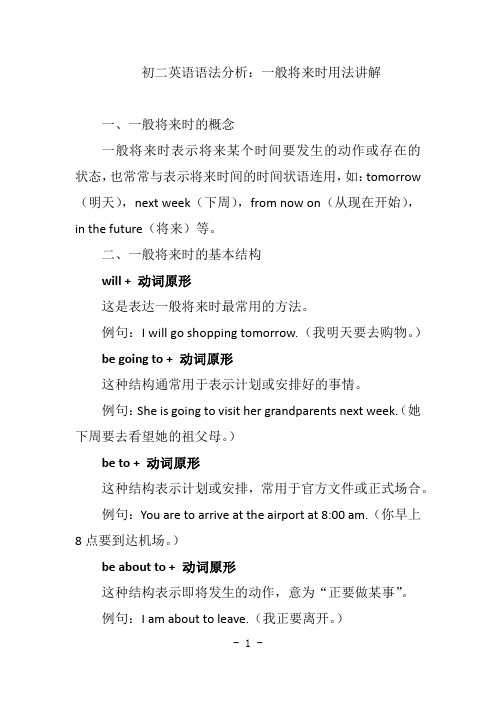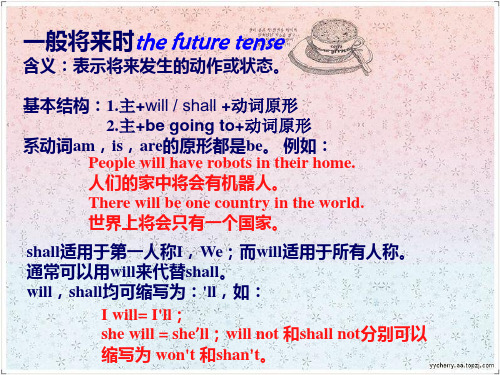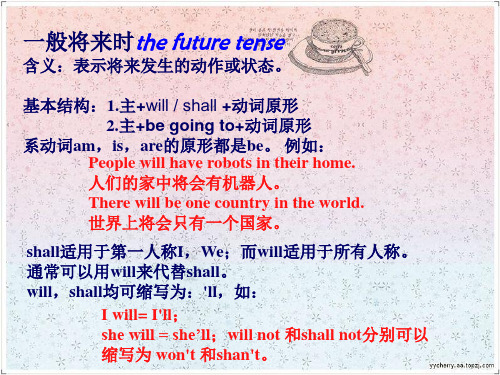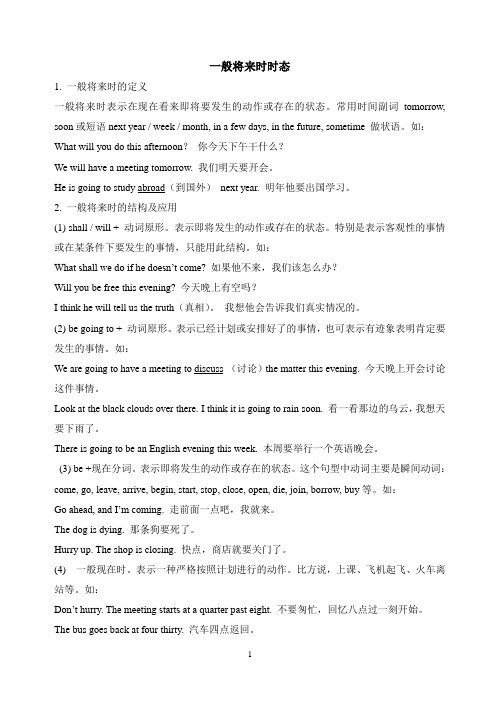一般将来时时态用法讲解.
完整版一般将来时时态用法讲解

般将来时时态1. 一般将来时的定义一般将来时表示在现在看来即将要发生的动作或存在的状态。
常用时间副词tomorrow, soon 或短语n ext year / week / mon th, in a few days, in the future, sometime 做状语。
如:What will you do this afternoon ? 你今天下午干什么?We will have a meet ing tomorrow. 我们明天要开会。
He is going to study abroad (到国外) next year.明年他要出国学习。
2. 一般将来时的结构及应用(1) shall / will + 动词原形。
表示即将发生的动作或存在的状态。
特别是表示客观性的事情或在某条件下要发生的事情,只能用此结构。
如:What shall we do if he doesn '如果他不?来,我们该怎么办?Will you be free this evenin g? 今天晚上有空吗?I think he will tell us the truth (真相)。
我想他会告诉我们真实情况的。
(2) be going to +动词原形。
表示已经计划或安排好了的事情,也可表示有迹象表明肯定要发生的事情。
如:We are going to have a meeting to discuss (讨论)the matter this evening. 今天晚上开会讨论这件事情。
Look at the black clouds over there. I think it is going to rain soon. 看一看那边的乌云,我想天要下雨了。
There is going to be an En glish evening this week. 本周要举行一个英语晚会。
(3) be +现在分词。
初二英语语法分析--一般将来时用法讲解

初二英语语法分析:一般将来时用法讲解一、一般将来时的概念一般将来时表示将来某个时间要发生的动作或存在的状态,也常常与表示将来时间的时间状语连用,如:tomorrow (明天),next week(下周),from now on(从现在开始),in the future(将来)等。
二、一般将来时的基本结构will + 动词原形这是表达一般将来时最常用的方法。
例句:I will go shopping tomorrow.(我明天要去购物。
)be going to + 动词原形这种结构通常用于表示计划或安排好的事情。
例句:She is going to visit her grandparents next week.(她下周要去看望她的祖父母。
)be to + 动词原形这种结构表示计划或安排,常用于官方文件或正式场合。
例句:You are to arrive at the airport at 8:00 am.(你早上8点要到达机场。
)be about to + 动词原形这种结构表示即将发生的动作,意为“正要做某事”。
例句:I am about to leave.(我正要离开。
)be due to + 动词原形这种结构表示某事预定或预期将要发生。
例句:The train is due to arrive at 5:00 pm.(火车预定下午5点到达。
)三、一般将来时的用法1表示将来的动作或状态例句:I will buy a new car next year.(明年我要买一辆新车。
)2表示将来的计划或安排例句:We are going to have a picnic this weekend.(我们这个周末要去野餐。
)3表示根据现有情况推测未来的可能性例句:It's going to rain soon.(很快就要下雨了。
)4表示命令、请求、建议等例句:You are to finish your homework before you go out.(你出去之前要把作业做完。
英语语法:一般将来时解释集

英语语法:一般将来时解释大全一、基本定义一般将来时是英语时态的一种,表示将来的动作或状态。
它主要用于描述未来的计划、预测或期望发生的事情。
二、形式构成一般将来时的构成主要有以下几种形式:1. 基本结构:主语+ will /shall + 动词原形+ 其他成分。
这是最基本的一般将来时形式,表示将来的动作或状态。
2. be going to 结构:主语+ be(am, is, are)going to + 动词原形+ 其他成分。
这种结构表示计划或安排将要发生的事情,也可以表示根据目前的迹象或情况预测将会发生的事情。
3. be+动词不定式:主语+ be(am, is, are)to + 动词原形+ 其他成分。
这种结构表示计划或安排将来要做的事情。
4. be+动词ing:主语+ be(am, is, are)+ 动词ing形式+ 其他成分。
这种结构表示即将发生的动作,通常与“when”连用。
5. be+表示时间的介词短语:主语+ be(am, is, are)+ 表示时间的介词短语。
这种结构用于表示将来某个时间点的情况。
6. 将来时间状语:tomorrow, next week, in the future等以上就是一般将来时的主要构成形式。
需要注意的是,在具体使用时,应根据语境和上下文选择合适的构成方式。
三、用法场景1. 表达未来的计划或意图,例如:I will go to the beach next summer.2. 描述未来的预测或期望,例如:It will rain this afternoon.3. 在条件句中表示将来的结果,例如:If you study hard, you will pass the exam.四、与其他时态的区别1. 与现在进行时态的区别:现在进行时态强调正在进行的动作,而一般将来时态强调将来的动作或状态。
2. 与过去时态的区别:过去时态表示过去的动作或状态,与将来时间无关。
一般将来时态讲解

will
说话人认为、相信、希望或假定要发生 的事,不含任何具体的时间,可以指遥 远的未来。 I believe China will become one of the richest countries in the world.
be going to
有迹象表明某事即将发生或肯定会发生, 通常表示很快就要发生的事情。 There is going to be a quarrel between them, I think.
• • • • • • •
Is there a film tonight? 今晚有电影吗? I write my paper tomorrow. Tomorrow is Christmas Day. When does the ship sail? She retires next month. How long does he stay? The plane takes off at eight and arrives in Beijing at eleven.
1.一般将来时的用法
• ①表示将来某一时间将要发生的动作或 存在的状态, I shall be free this afternoon. • There'll be no chemistry classes tomorrow. • They will probably go to Shanghai for their holiday. • 注意:在口语中,常用will / shall + be doing结构来代替will / shall + 动词原形, 以表示生动。 • I‘ll be seeing a friend off at the airport. • He'll be going with us tomorrow.
初中英语一般将来时专项语法讲解

初中英语一般将来时专项语法讲解-CAL-FENGHAI.-(YICAI)-Company One1一般将来时主要构成形式一般将来时表示将来某个时间要发生的动作,事情或存在的状态,也表示将来经常或反复发生的动作或事情。
1)will/shall+动词原形 shall用于第一人称,常被will 所代替。
will 在陈述句中用于各人称,在征求意见时常用于第二人称。
will not=won't shall not=shan't例如:Which paragraph shall I read first 我先读哪一段呢Will you be at home at seven this evening 今晚七点回家好吗2) be going to +不定式,表示将来。
a. 主语的意图,即将做某事。
例如:What are you going to do tomorro w 明天打算作什么呢b. 计划,安排要发生的事。
例如:The play is going to be produced next month。
这出戏下月开播。
c. 有迹象要发生的事。
例如:Look at the dark clouds, there is going to b e a storm. 看那乌云,快要下雨了。
3) be +不定式表将来,按计划或正式安排将发生的事。
例如:We are to discuss the report next Saturday.我们下星期六讨论这份报告。
4) be about to +不定式,意为马上做某事。
例如:He is about to leave for Beijing. 他马上要去北京。
注意:be about to do 不能与tomorrow, next week 等表示明确将来时的时间状语连用。
Notice:be to和be going tobe to 表示客观安排或受人指示而做某事,be going to 表示主观的打算或计划。
英语动词时态用法归纳:一般将来时

英语动词时态用法归纳:一般将来时一、一般将来时的构成一般将来时的由s hall / will+ 动词原形构成。
二、一般将来时的基本用法(1) 表示单纯的将要发生的动作或情况。
常与表示将来的时间状语连用。
如:Tomorrow will be Sunday. 明天是星期天。
They say that it will rain. 他们说要下雨。
I’ll be thirty-seven on my next birthday. 到下次生日,我就三十七岁了。
We won’t be free tonight. 今晚我们没空。
(2) 也可以表示临时决定要做的事。
如:—I thought I asked you to sweep the floor.—O h, I’m sorry. Mother, I will do it right now.—我原以为我让你扫地了。
—噢,对不起,妈妈,我就做。
—You have left the door open.—O h, so I have. I’ll go and lock it.—你忘了锁门。
—哦,是的。
我就去。
(3) 有时虽没有时间状语,但从意思上可以判断指将来的动作。
如:Who will take the chair? 谁当主席?You will pass the examination. 你会通过那个考试的。
The meeting won’t last long. 会开不了多久。
(4) 一般将来时有时还表示倾向和习惯性。
如:Oil will float on water. 油总浮在水面上。
Fish will die without water。
鱼离开水就会死掉。
The machine won't work because of a faulty connection. 机器电源线接错了,所以开不动。
三、表示将来时的几种方法(1) be going to+动词原形。
一般将来时态讲解

1. Do you want a job at Village Paints?
Please talk to ____u__s____ on Monday.
Marie and me
2. Give __h_im___ an umbrella. It’s raining.
Mr. Loyola
3. This coffee is cold. Please bring __h_e_r___some hot coffee.
Beijing at eleven.
4.一般将来时的常用结构
• ①用于“I expect, I‘m sure, I think, I wonder + 宾语从句”中
• Don't worry about the exam. I'm sure you'll pass.
• 不要担心这次考试,我确信你会通过的。
6.He will be
(be) back in three hours.
7.We will send (send) for a doctor if
you
are
(be) not better in the evening.
• 3.其他一般将来时态结构
• 1.现在进行时表将来(be + doing) • 表示某个按最近的计划或安排即将要进行的动作,an arrangement
• That bag looks heavy. I'll help you with it. • I won't tell anyone what happened, I
promise. • ④表示一种倾向或推测 • Flowers will die without water. • Water will change into ice at 0℃. • This will be your sister, I guess.
(完整版)一般将来时时态用法讲解

一般将来时时态1. 一般将来时的定义一般将来时表示在现在看来即将要发生的动作或存在的状态。
常用时间副词tomorrow, soon或短语next year / week / month, in a few days, in the future, sometime 做状语。
如:What will you do this afternoon?你今天下午干什么?We will have a meeting tomorrow. 我们明天要开会。
He is going to study abroad(到国外)next year. 明年他要出国学习。
2. 一般将来时的结构及应用(1) shall / will + 动词原形。
表示即将发生的动作或存在的状态。
特别是表示客观性的事情或在某条件下要发生的事情,只能用此结构。
如:What shall we do if he doesn’t come? 如果他不来,我们该怎么办?Will you be free this evening? 今天晚上有空吗?I think he will tell us the truth(真相)。
我想他会告诉我们真实情况的。
(2) be going to + 动词原形。
表示已经计划或安排好了的事情,也可表示有迹象表明肯定要发生的事情。
如:We are going to have a meeting to discuss (讨论)the matter this evening. 今天晚上开会讨论这件事情。
Look at the black clouds over there. I think it is going to rain soon. 看一看那边的乌云,我想天要下雨了。
There is going to be an English evening this week. 本周要举行一个英语晚会。
(3) be +现在分词。
表示即将发生的动作或存在的状态。
- 1、下载文档前请自行甄别文档内容的完整性,平台不提供额外的编辑、内容补充、找答案等附加服务。
- 2、"仅部分预览"的文档,不可在线预览部分如存在完整性等问题,可反馈申请退款(可完整预览的文档不适用该条件!)。
- 3、如文档侵犯您的权益,请联系客服反馈,我们会尽快为您处理(人工客服工作时间:9:00-18:30)。
一般将来时时态1. 一般将来时的定义一般将来时表示在现在看来即将要发生的动作或存在的状态。
常用时间副词tomorrow, soon或短语next year / week / month, in a few days, in the future, sometime 做状语。
如:What will you do this afternoon?你今天下午干什么?We will have a meeting tomorrow. 我们明天要开会。
He is going to study abroad(到国外)next year. 明年他要出国学习。
2. 一般将来时的结构及应用(1) shall / will + 动词原形。
表示即将发生的动作或存在的状态。
特别是表示客观性的事情或在某条件下要发生的事情,只能用此结构。
如:What shall we do if he doesn’t come? 如果他不来,我们该怎么办?Will you be free this evening? 今天晚上有空吗?I think he will tell us the truth(真相)。
我想他会告诉我们真实情况的。
(2) be going to + 动词原形。
表示已经计划或安排好了的事情,也可表示有迹象表明肯定要发生的事情。
如:We are going to have a meeting to discuss (讨论)the matter this evening. 今天晚上开会讨论这件事情。
Look at the black clouds over there. I think it is going to rain soon. 看一看那边的乌云,我想天要下雨了。
There is going to be an English evening this week. 本周要举行一个英语晚会。
(3) be +现在分词。
表示即将发生的动作或存在的状态。
这个句型中动词主要是瞬间动词:come, go, leave, arrive, begin, start, stop, close, open, die, join, borrow, buy等。
如:Go ahead, and I’m coming. 走前面一点吧,我就来。
The dog is dying. 那条狗要死了。
Hurry up. The shop is closing. 快点,商店就要关门了。
(4) 一般现在时。
表示一种严格按照计划进行的动作。
比方说,上课、飞机起飞、火车离站等。
如:Don’t hurry. The meeting starts at a quarter past eight. 不要匆忙,回忆八点过一刻开始。
The bus goes back at four thirty. 汽车四点返回。
巩固练习:一、用所给动词的适当形式填空1. Li Lei tells me he _________________(visit)the Great Wall(长城) this weekend.2. My mother _________________(buy)me a pair of new trousers tomorrow.3. She says she _________________(leave)soon.4. We _________________(go) skating if it doesn’t rain next Sunday.5. There _________________(be)an English evening next week.6. Think over, and you _________________(get)a good idea.7. —— ___________Jim ___________(have)a picnic next Monday?——-No, he __________.8. I _________________(miss)you after you leave here.9. Who _________________(teach)you English next year10. He _________________ (be) back in three hours.11. Look at these clouds. It ___________________ (rain).二、改错:每处划线中有错误,在题后改正1. He will sing and dances for us tomorrow.2. Are you going to swim? ------Yes, I will.3. He will help Jim with his English every day.4. Will her sister sings a song for me tomorrow?5. They willn’t plant trees next week.6. Are they going to plays basketball tomorrow?7. Will we go to visit the factory tomorrow?8. Paul will be going to make dumplings for Emma.9. Are the boys going to the Great Wall next month? ------Yes, they will.三、句型转换:Jim is going to play football tomorrow. Mary will clean the windows next week.否定句:____________________________ ______________________________一般疑问句:_____________________________ ______________________________ 两回答:___________________________ _____________________________特殊疑问句:______________________ _____________________________四、选择题( )1. —Are you going to _______ our English team?—Yes, I am.A. take part inB. joinC. took part inD. joined( )2. Xu Xia and her teammates are _______ the USA next week.A. leaving forB. leave forC. leaveD. left( )3. There _______ an English party in our class next week.A. is going to haveB. is going to beC. will haveD. Have( ) 4. If it _______ tomorrow, we will go to the park.A. isn’t rainB. don’t rainC. doesn’t rainD. won’t rain( )5. There ______ a football match next week. Shall we go and watch it?A. will haveB. hasC. haveD. will be“Would you mind doing…”句型透视mind用作动词时,习惯后接动名词(短语)作宾语,而不接动词不定式,常用于Would you mind doing…?句型中,具体用法是:1. “Would you mind doing…?”句型常用于表示请求,意思是“请你做……你是否介意?、请你做……好吗?”,是一种比较客气的表达方式。
如:Would you mind turning off the light in the room?请你把房间里的灯关掉好吗?如果要表示“请你不要做……你是否介意?、请你不要做……好吗?”,只需要在doing 前面加上not.如:Would you mind not standing in front of me?请你不要站在我的前面好吗?2. 如果同意,表示不介意时,可用如下用语来表达:Certainly/Of course not./Not at all./No,not at all;如果不同意,表示介意时,常用“Sorry/I‘m sorry.”(对不起)及陈述某种理由来表示拒绝或反对。
如:—Would you mind going to the movies this evening?今晚去看电影好吗?—I‘m sorry. But I haven’t finished my homework yet.对不起,我的作业还没有完成。
学习时还要注意:1.“Would you mind doing…?”句型中的would也可用do代替,但语气较生硬,不如用would客气。
2.“Would you mind doing…?”句型中的逻辑主语只能是谈话的对方you.如果想要对方允许自己做某事,可用“Would you mind my doing…?”句型,如:Would you mind my smoking here?你介意我在这里吸烟吗?巩固练习:一、用下面提供的短语完成句子。
1. help me wash my clothesWould you mind ______________________________?2. give her a cup of teaWould you mind _______________________________?3. help him mend his carDo you have _______________________________?4. walk on the roadWould you mind _______________________________ on the road?二、选择题( )1. —Would you mind _______ us in the game?—Not at all.A. joiningB. joinC. join inD. joining in( )2. —Would you like to climb mountains with me this Sunday?—I’d love to. But I _______ play table tennis against Class Three.A. am goingB. am going toC. amD. going to( )3. —Would you mind _______here?—I’m sorry about that. I’ll go some where else.A. no smokingB. not smokingC. no smokeD. not smokehad better用法详解1. had better 的基本用法特点其意为“最好”、“应该”,后接动词原形,与情态动词should用法相似,其中的had通常缩略为’d:You’d better get some sleep.你最好去睡一会儿。
